Benner's Novice to Expert Model: Stages and Application in Nursing
VerifiedAdded on 2023/06/01
|9
|2429
|214
Essay
AI Summary
This essay provides a comprehensive discussion of Patricia Benner's 'Novice to Expert' theory, which categorizes the development of nursing expertise into five stages: novice, advanced beginner, competent, proficient, and expert. It highlights that clinical experience is crucial for developing nursing knowledge and skills, enabling nurses to provide holistic and competent patient care. The essay details the characteristics of each stage, emphasizing the progression from reliance on abstract principles to the utilization of past experiences. It explores how Benner's model is applied in nursing practice, particularly in nursing education and competency assessment. Examples from referenced journal articles are used to illustrate the theory's impact on developing facilitator skills, improving intuitive knowledge, and fostering effective teamwork among nursing professionals. The essay concludes that Benner's model is valuable for both students and educators in enhancing expertise and ensuring high-quality patient care.
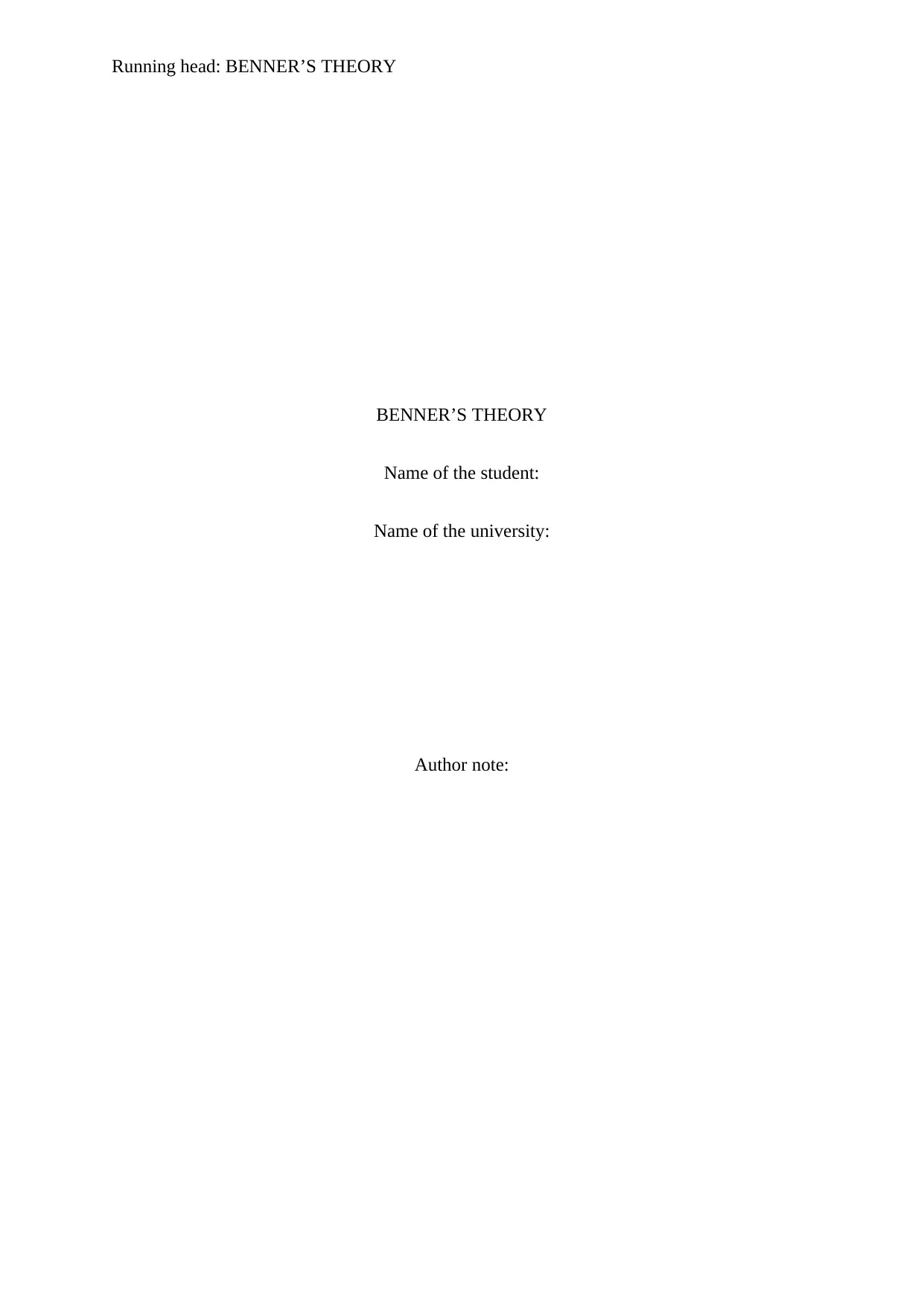
Running head: BENNER’S THEORY
BENNER’S THEORY
Name of the student:
Name of the university:
Author note:
BENNER’S THEORY
Name of the student:
Name of the university:
Author note:
Paraphrase This Document
Need a fresh take? Get an instant paraphrase of this document with our AI Paraphraser
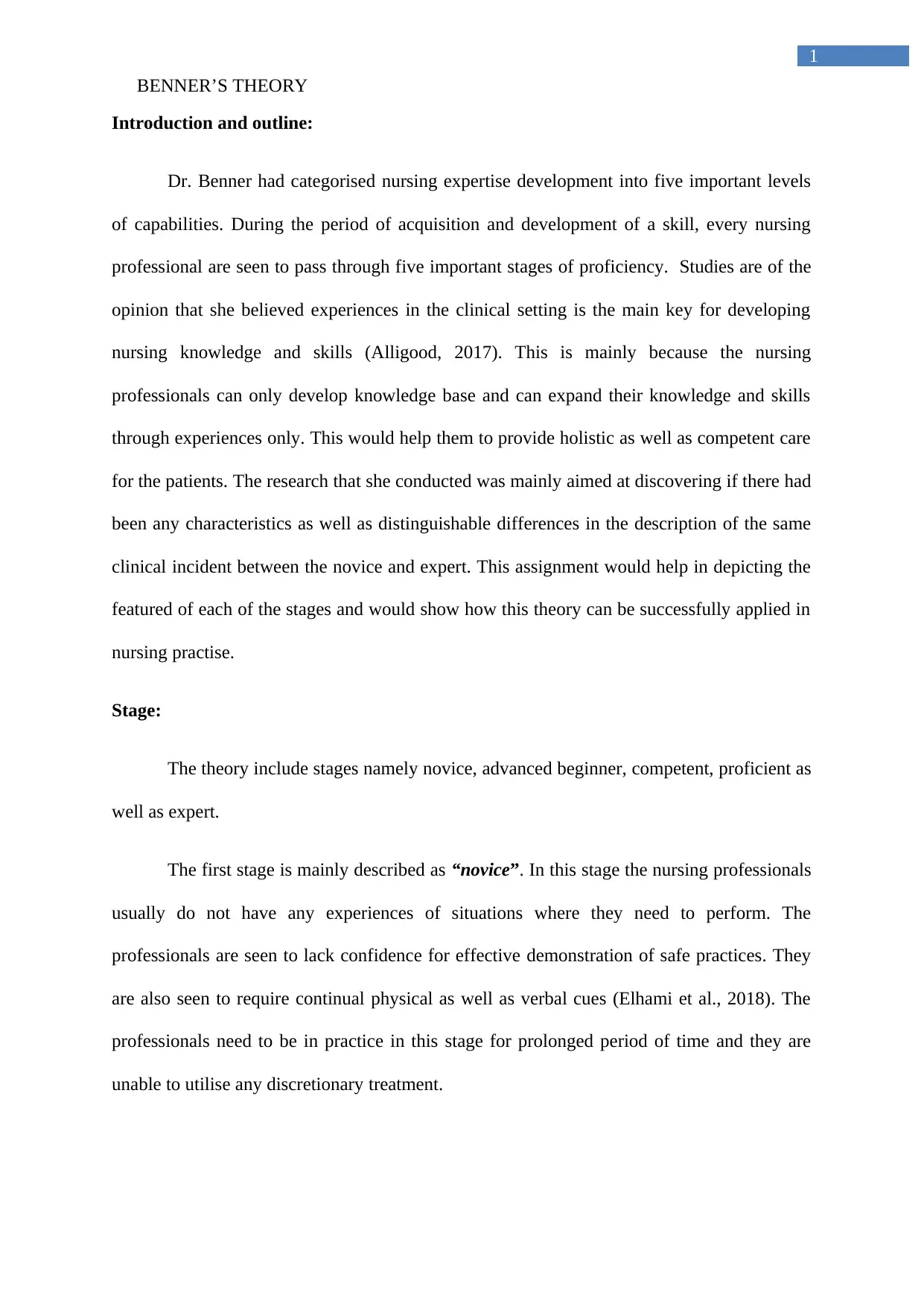
1
BENNER’S THEORY
Introduction and outline:
Dr. Benner had categorised nursing expertise development into five important levels
of capabilities. During the period of acquisition and development of a skill, every nursing
professional are seen to pass through five important stages of proficiency. Studies are of the
opinion that she believed experiences in the clinical setting is the main key for developing
nursing knowledge and skills (Alligood, 2017). This is mainly because the nursing
professionals can only develop knowledge base and can expand their knowledge and skills
through experiences only. This would help them to provide holistic as well as competent care
for the patients. The research that she conducted was mainly aimed at discovering if there had
been any characteristics as well as distinguishable differences in the description of the same
clinical incident between the novice and expert. This assignment would help in depicting the
featured of each of the stages and would show how this theory can be successfully applied in
nursing practise.
Stage:
The theory include stages namely novice, advanced beginner, competent, proficient as
well as expert.
The first stage is mainly described as “novice”. In this stage the nursing professionals
usually do not have any experiences of situations where they need to perform. The
professionals are seen to lack confidence for effective demonstration of safe practices. They
are also seen to require continual physical as well as verbal cues (Elhami et al., 2018). The
professionals need to be in practice in this stage for prolonged period of time and they are
unable to utilise any discretionary treatment.
BENNER’S THEORY
Introduction and outline:
Dr. Benner had categorised nursing expertise development into five important levels
of capabilities. During the period of acquisition and development of a skill, every nursing
professional are seen to pass through five important stages of proficiency. Studies are of the
opinion that she believed experiences in the clinical setting is the main key for developing
nursing knowledge and skills (Alligood, 2017). This is mainly because the nursing
professionals can only develop knowledge base and can expand their knowledge and skills
through experiences only. This would help them to provide holistic as well as competent care
for the patients. The research that she conducted was mainly aimed at discovering if there had
been any characteristics as well as distinguishable differences in the description of the same
clinical incident between the novice and expert. This assignment would help in depicting the
featured of each of the stages and would show how this theory can be successfully applied in
nursing practise.
Stage:
The theory include stages namely novice, advanced beginner, competent, proficient as
well as expert.
The first stage is mainly described as “novice”. In this stage the nursing professionals
usually do not have any experiences of situations where they need to perform. The
professionals are seen to lack confidence for effective demonstration of safe practices. They
are also seen to require continual physical as well as verbal cues (Elhami et al., 2018). The
professionals need to be in practice in this stage for prolonged period of time and they are
unable to utilise any discretionary treatment.
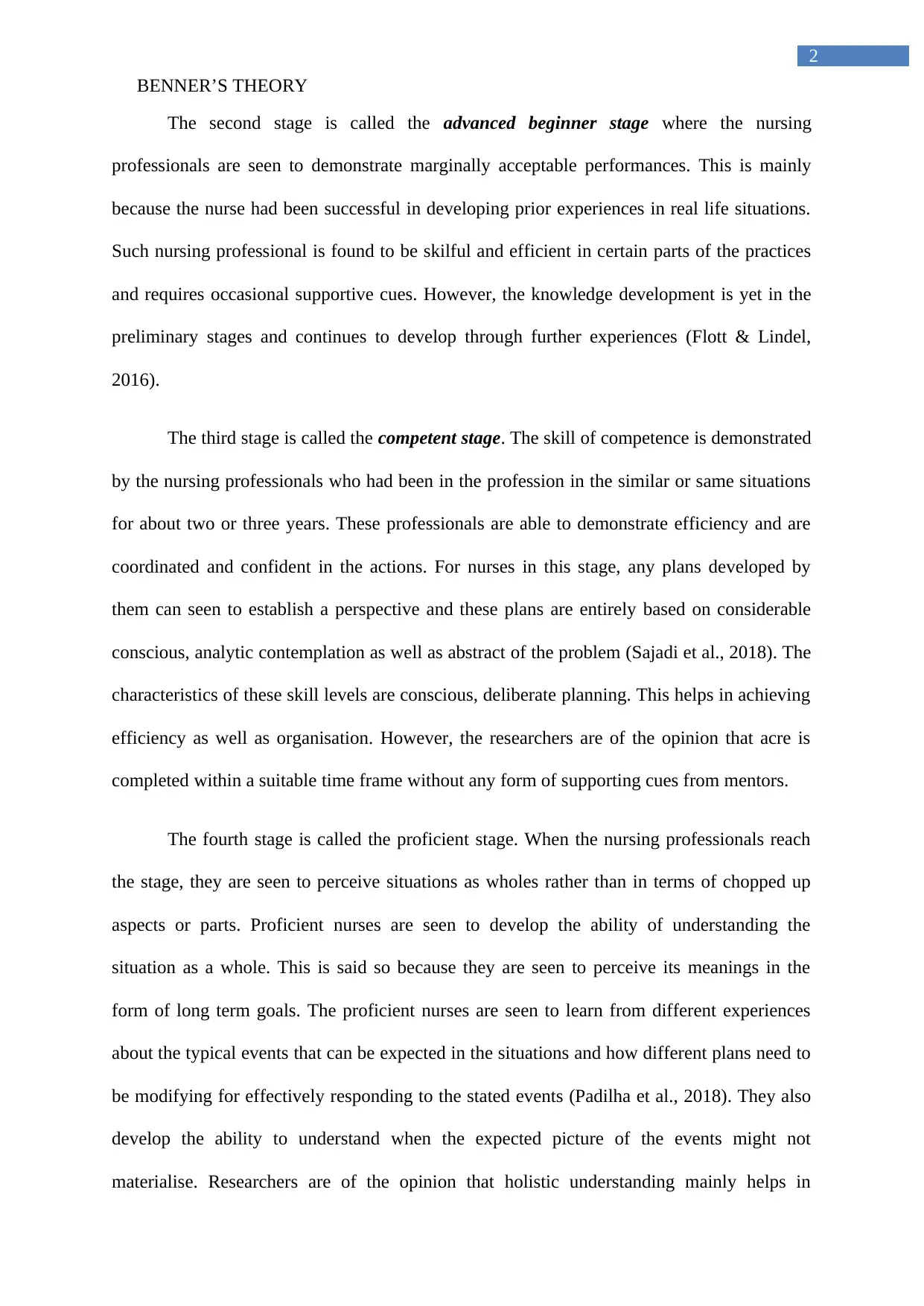
2
BENNER’S THEORY
The second stage is called the advanced beginner stage where the nursing
professionals are seen to demonstrate marginally acceptable performances. This is mainly
because the nurse had been successful in developing prior experiences in real life situations.
Such nursing professional is found to be skilful and efficient in certain parts of the practices
and requires occasional supportive cues. However, the knowledge development is yet in the
preliminary stages and continues to develop through further experiences (Flott & Lindel,
2016).
The third stage is called the competent stage. The skill of competence is demonstrated
by the nursing professionals who had been in the profession in the similar or same situations
for about two or three years. These professionals are able to demonstrate efficiency and are
coordinated and confident in the actions. For nurses in this stage, any plans developed by
them can seen to establish a perspective and these plans are entirely based on considerable
conscious, analytic contemplation as well as abstract of the problem (Sajadi et al., 2018). The
characteristics of these skill levels are conscious, deliberate planning. This helps in achieving
efficiency as well as organisation. However, the researchers are of the opinion that acre is
completed within a suitable time frame without any form of supporting cues from mentors.
The fourth stage is called the proficient stage. When the nursing professionals reach
the stage, they are seen to perceive situations as wholes rather than in terms of chopped up
aspects or parts. Proficient nurses are seen to develop the ability of understanding the
situation as a whole. This is said so because they are seen to perceive its meanings in the
form of long term goals. The proficient nurses are seen to learn from different experiences
about the typical events that can be expected in the situations and how different plans need to
be modifying for effectively responding to the stated events (Padilha et al., 2018). They also
develop the ability to understand when the expected picture of the events might not
materialise. Researchers are of the opinion that holistic understanding mainly helps in
BENNER’S THEORY
The second stage is called the advanced beginner stage where the nursing
professionals are seen to demonstrate marginally acceptable performances. This is mainly
because the nurse had been successful in developing prior experiences in real life situations.
Such nursing professional is found to be skilful and efficient in certain parts of the practices
and requires occasional supportive cues. However, the knowledge development is yet in the
preliminary stages and continues to develop through further experiences (Flott & Lindel,
2016).
The third stage is called the competent stage. The skill of competence is demonstrated
by the nursing professionals who had been in the profession in the similar or same situations
for about two or three years. These professionals are able to demonstrate efficiency and are
coordinated and confident in the actions. For nurses in this stage, any plans developed by
them can seen to establish a perspective and these plans are entirely based on considerable
conscious, analytic contemplation as well as abstract of the problem (Sajadi et al., 2018). The
characteristics of these skill levels are conscious, deliberate planning. This helps in achieving
efficiency as well as organisation. However, the researchers are of the opinion that acre is
completed within a suitable time frame without any form of supporting cues from mentors.
The fourth stage is called the proficient stage. When the nursing professionals reach
the stage, they are seen to perceive situations as wholes rather than in terms of chopped up
aspects or parts. Proficient nurses are seen to develop the ability of understanding the
situation as a whole. This is said so because they are seen to perceive its meanings in the
form of long term goals. The proficient nurses are seen to learn from different experiences
about the typical events that can be expected in the situations and how different plans need to
be modifying for effectively responding to the stated events (Padilha et al., 2018). They also
develop the ability to understand when the expected picture of the events might not
materialise. Researchers are of the opinion that holistic understanding mainly helps in
⊘ This is a preview!⊘
Do you want full access?
Subscribe today to unlock all pages.

Trusted by 1+ million students worldwide
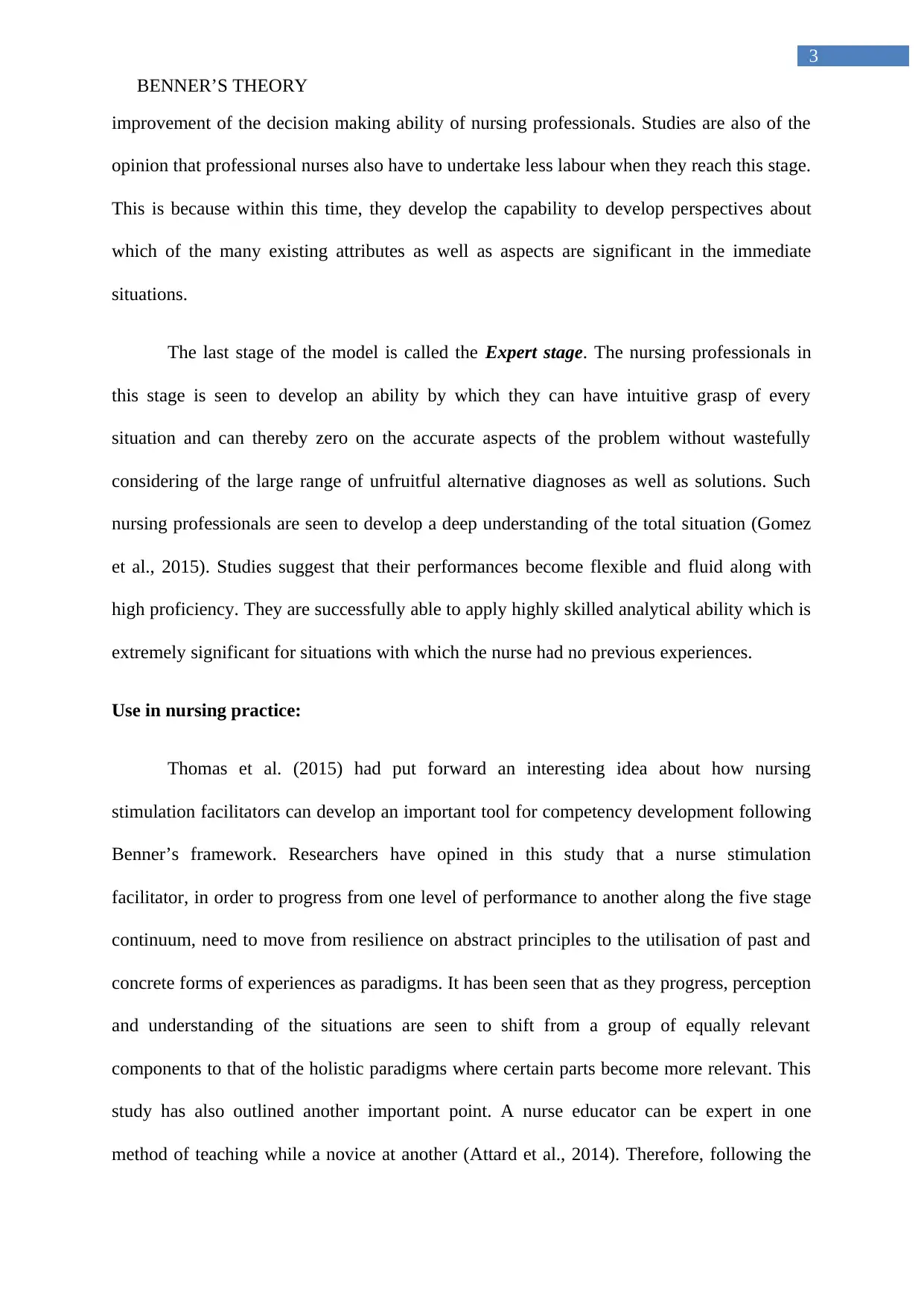
3
BENNER’S THEORY
improvement of the decision making ability of nursing professionals. Studies are also of the
opinion that professional nurses also have to undertake less labour when they reach this stage.
This is because within this time, they develop the capability to develop perspectives about
which of the many existing attributes as well as aspects are significant in the immediate
situations.
The last stage of the model is called the Expert stage. The nursing professionals in
this stage is seen to develop an ability by which they can have intuitive grasp of every
situation and can thereby zero on the accurate aspects of the problem without wastefully
considering of the large range of unfruitful alternative diagnoses as well as solutions. Such
nursing professionals are seen to develop a deep understanding of the total situation (Gomez
et al., 2015). Studies suggest that their performances become flexible and fluid along with
high proficiency. They are successfully able to apply highly skilled analytical ability which is
extremely significant for situations with which the nurse had no previous experiences.
Use in nursing practice:
Thomas et al. (2015) had put forward an interesting idea about how nursing
stimulation facilitators can develop an important tool for competency development following
Benner’s framework. Researchers have opined in this study that a nurse stimulation
facilitator, in order to progress from one level of performance to another along the five stage
continuum, need to move from resilience on abstract principles to the utilisation of past and
concrete forms of experiences as paradigms. It has been seen that as they progress, perception
and understanding of the situations are seen to shift from a group of equally relevant
components to that of the holistic paradigms where certain parts become more relevant. This
study has also outlined another important point. A nurse educator can be expert in one
method of teaching while a novice at another (Attard et al., 2014). Therefore, following the
BENNER’S THEORY
improvement of the decision making ability of nursing professionals. Studies are also of the
opinion that professional nurses also have to undertake less labour when they reach this stage.
This is because within this time, they develop the capability to develop perspectives about
which of the many existing attributes as well as aspects are significant in the immediate
situations.
The last stage of the model is called the Expert stage. The nursing professionals in
this stage is seen to develop an ability by which they can have intuitive grasp of every
situation and can thereby zero on the accurate aspects of the problem without wastefully
considering of the large range of unfruitful alternative diagnoses as well as solutions. Such
nursing professionals are seen to develop a deep understanding of the total situation (Gomez
et al., 2015). Studies suggest that their performances become flexible and fluid along with
high proficiency. They are successfully able to apply highly skilled analytical ability which is
extremely significant for situations with which the nurse had no previous experiences.
Use in nursing practice:
Thomas et al. (2015) had put forward an interesting idea about how nursing
stimulation facilitators can develop an important tool for competency development following
Benner’s framework. Researchers have opined in this study that a nurse stimulation
facilitator, in order to progress from one level of performance to another along the five stage
continuum, need to move from resilience on abstract principles to the utilisation of past and
concrete forms of experiences as paradigms. It has been seen that as they progress, perception
and understanding of the situations are seen to shift from a group of equally relevant
components to that of the holistic paradigms where certain parts become more relevant. This
study has also outlined another important point. A nurse educator can be expert in one
method of teaching while a novice at another (Attard et al., 2014). Therefore, following the
Paraphrase This Document
Need a fresh take? Get an instant paraphrase of this document with our AI Paraphraser
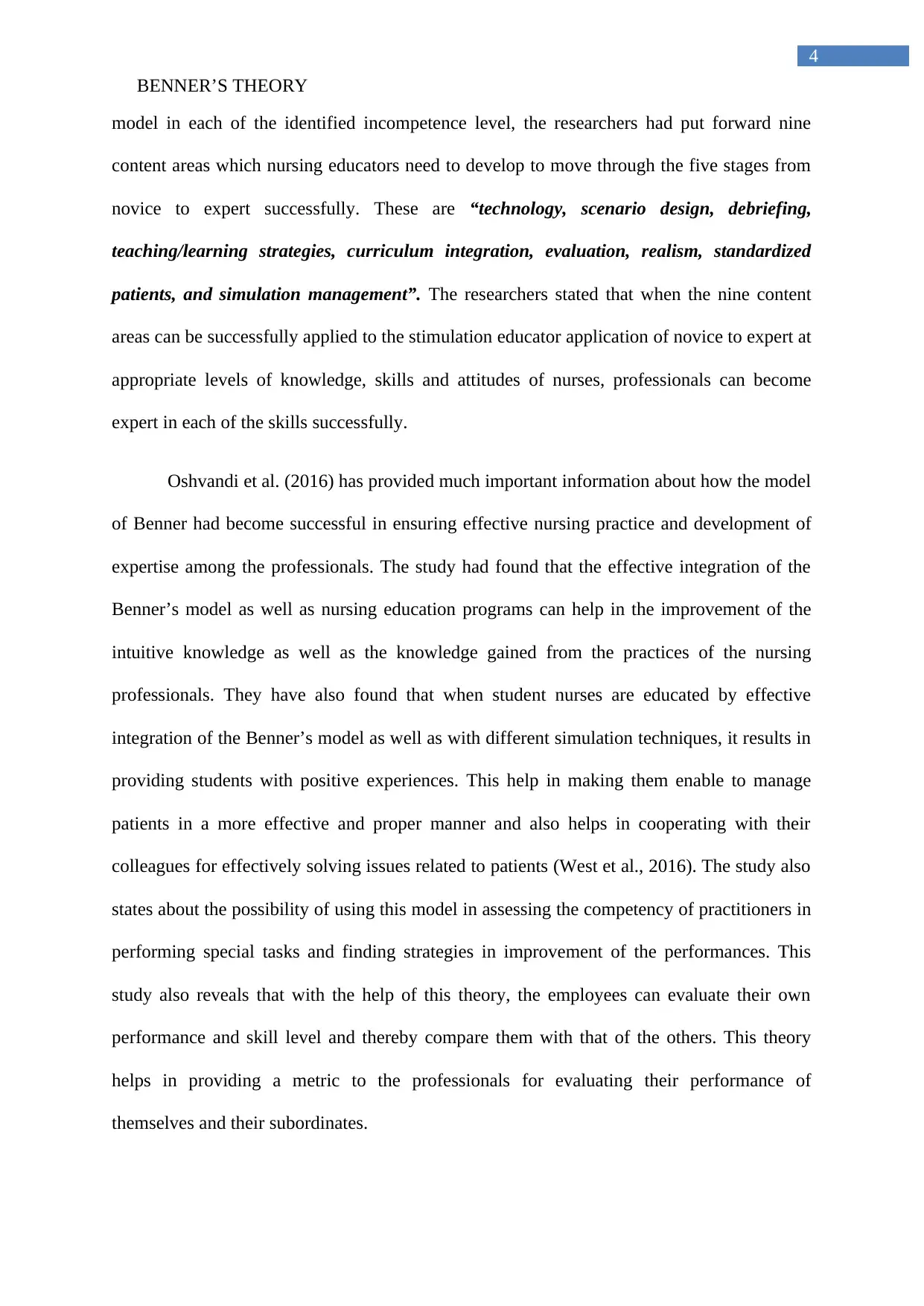
4
BENNER’S THEORY
model in each of the identified incompetence level, the researchers had put forward nine
content areas which nursing educators need to develop to move through the five stages from
novice to expert successfully. These are “technology, scenario design, debriefing,
teaching/learning strategies, curriculum integration, evaluation, realism, standardized
patients, and simulation management”. The researchers stated that when the nine content
areas can be successfully applied to the stimulation educator application of novice to expert at
appropriate levels of knowledge, skills and attitudes of nurses, professionals can become
expert in each of the skills successfully.
Oshvandi et al. (2016) has provided much important information about how the model
of Benner had become successful in ensuring effective nursing practice and development of
expertise among the professionals. The study had found that the effective integration of the
Benner’s model as well as nursing education programs can help in the improvement of the
intuitive knowledge as well as the knowledge gained from the practices of the nursing
professionals. They have also found that when student nurses are educated by effective
integration of the Benner’s model as well as with different simulation techniques, it results in
providing students with positive experiences. This help in making them enable to manage
patients in a more effective and proper manner and also helps in cooperating with their
colleagues for effectively solving issues related to patients (West et al., 2016). The study also
states about the possibility of using this model in assessing the competency of practitioners in
performing special tasks and finding strategies in improvement of the performances. This
study also reveals that with the help of this theory, the employees can evaluate their own
performance and skill level and thereby compare them with that of the others. This theory
helps in providing a metric to the professionals for evaluating their performance of
themselves and their subordinates.
BENNER’S THEORY
model in each of the identified incompetence level, the researchers had put forward nine
content areas which nursing educators need to develop to move through the five stages from
novice to expert successfully. These are “technology, scenario design, debriefing,
teaching/learning strategies, curriculum integration, evaluation, realism, standardized
patients, and simulation management”. The researchers stated that when the nine content
areas can be successfully applied to the stimulation educator application of novice to expert at
appropriate levels of knowledge, skills and attitudes of nurses, professionals can become
expert in each of the skills successfully.
Oshvandi et al. (2016) has provided much important information about how the model
of Benner had become successful in ensuring effective nursing practice and development of
expertise among the professionals. The study had found that the effective integration of the
Benner’s model as well as nursing education programs can help in the improvement of the
intuitive knowledge as well as the knowledge gained from the practices of the nursing
professionals. They have also found that when student nurses are educated by effective
integration of the Benner’s model as well as with different simulation techniques, it results in
providing students with positive experiences. This help in making them enable to manage
patients in a more effective and proper manner and also helps in cooperating with their
colleagues for effectively solving issues related to patients (West et al., 2016). The study also
states about the possibility of using this model in assessing the competency of practitioners in
performing special tasks and finding strategies in improvement of the performances. This
study also reveals that with the help of this theory, the employees can evaluate their own
performance and skill level and thereby compare them with that of the others. This theory
helps in providing a metric to the professionals for evaluating their performance of
themselves and their subordinates.
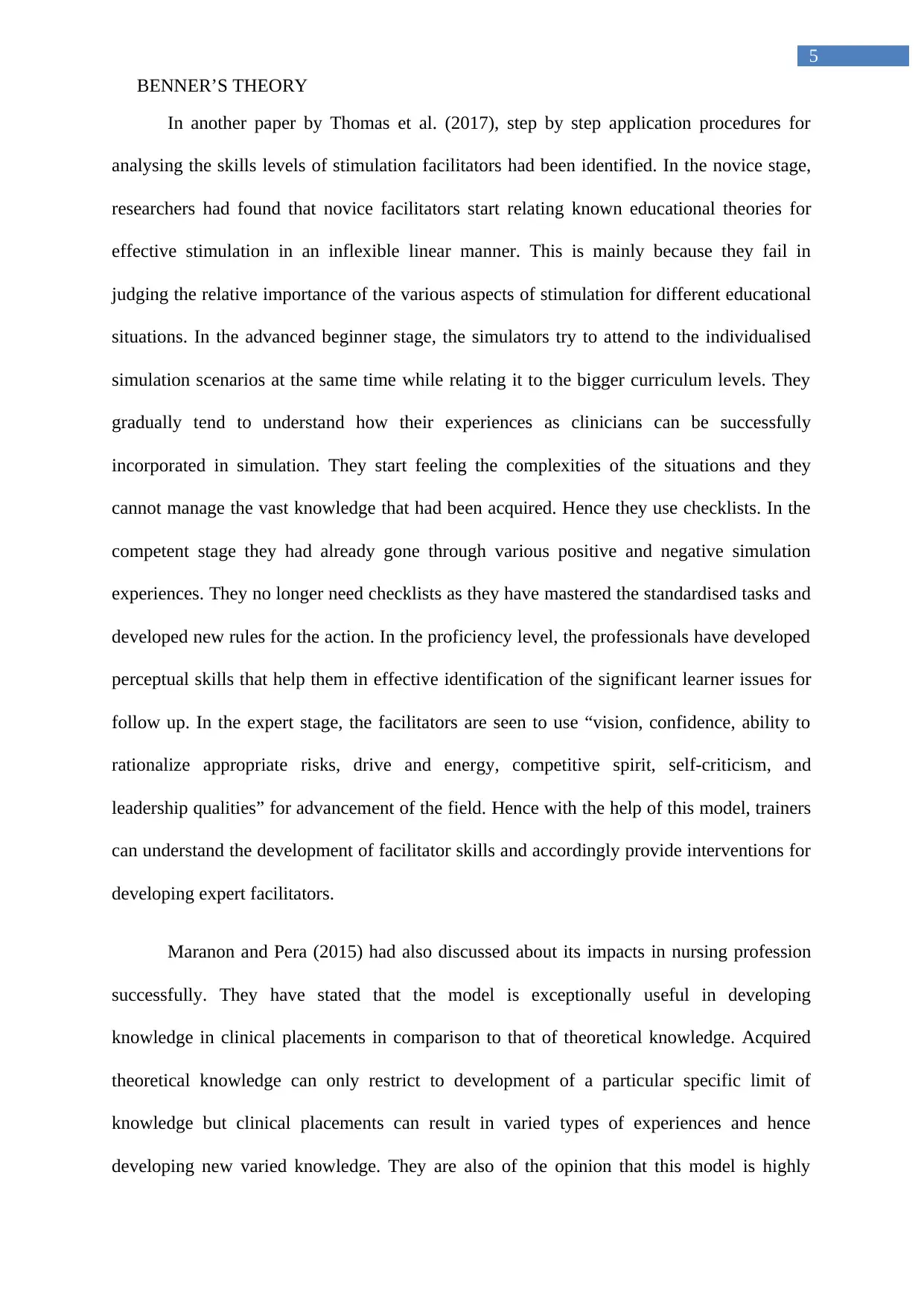
5
BENNER’S THEORY
In another paper by Thomas et al. (2017), step by step application procedures for
analysing the skills levels of stimulation facilitators had been identified. In the novice stage,
researchers had found that novice facilitators start relating known educational theories for
effective stimulation in an inflexible linear manner. This is mainly because they fail in
judging the relative importance of the various aspects of stimulation for different educational
situations. In the advanced beginner stage, the simulators try to attend to the individualised
simulation scenarios at the same time while relating it to the bigger curriculum levels. They
gradually tend to understand how their experiences as clinicians can be successfully
incorporated in simulation. They start feeling the complexities of the situations and they
cannot manage the vast knowledge that had been acquired. Hence they use checklists. In the
competent stage they had already gone through various positive and negative simulation
experiences. They no longer need checklists as they have mastered the standardised tasks and
developed new rules for the action. In the proficiency level, the professionals have developed
perceptual skills that help them in effective identification of the significant learner issues for
follow up. In the expert stage, the facilitators are seen to use “vision, confidence, ability to
rationalize appropriate risks, drive and energy, competitive spirit, self-criticism, and
leadership qualities” for advancement of the field. Hence with the help of this model, trainers
can understand the development of facilitator skills and accordingly provide interventions for
developing expert facilitators.
Maranon and Pera (2015) had also discussed about its impacts in nursing profession
successfully. They have stated that the model is exceptionally useful in developing
knowledge in clinical placements in comparison to that of theoretical knowledge. Acquired
theoretical knowledge can only restrict to development of a particular specific limit of
knowledge but clinical placements can result in varied types of experiences and hence
developing new varied knowledge. They are also of the opinion that this model is highly
BENNER’S THEORY
In another paper by Thomas et al. (2017), step by step application procedures for
analysing the skills levels of stimulation facilitators had been identified. In the novice stage,
researchers had found that novice facilitators start relating known educational theories for
effective stimulation in an inflexible linear manner. This is mainly because they fail in
judging the relative importance of the various aspects of stimulation for different educational
situations. In the advanced beginner stage, the simulators try to attend to the individualised
simulation scenarios at the same time while relating it to the bigger curriculum levels. They
gradually tend to understand how their experiences as clinicians can be successfully
incorporated in simulation. They start feeling the complexities of the situations and they
cannot manage the vast knowledge that had been acquired. Hence they use checklists. In the
competent stage they had already gone through various positive and negative simulation
experiences. They no longer need checklists as they have mastered the standardised tasks and
developed new rules for the action. In the proficiency level, the professionals have developed
perceptual skills that help them in effective identification of the significant learner issues for
follow up. In the expert stage, the facilitators are seen to use “vision, confidence, ability to
rationalize appropriate risks, drive and energy, competitive spirit, self-criticism, and
leadership qualities” for advancement of the field. Hence with the help of this model, trainers
can understand the development of facilitator skills and accordingly provide interventions for
developing expert facilitators.
Maranon and Pera (2015) had also discussed about its impacts in nursing profession
successfully. They have stated that the model is exceptionally useful in developing
knowledge in clinical placements in comparison to that of theoretical knowledge. Acquired
theoretical knowledge can only restrict to development of a particular specific limit of
knowledge but clinical placements can result in varied types of experiences and hence
developing new varied knowledge. They are also of the opinion that this model is highly
⊘ This is a preview!⊘
Do you want full access?
Subscribe today to unlock all pages.

Trusted by 1+ million students worldwide
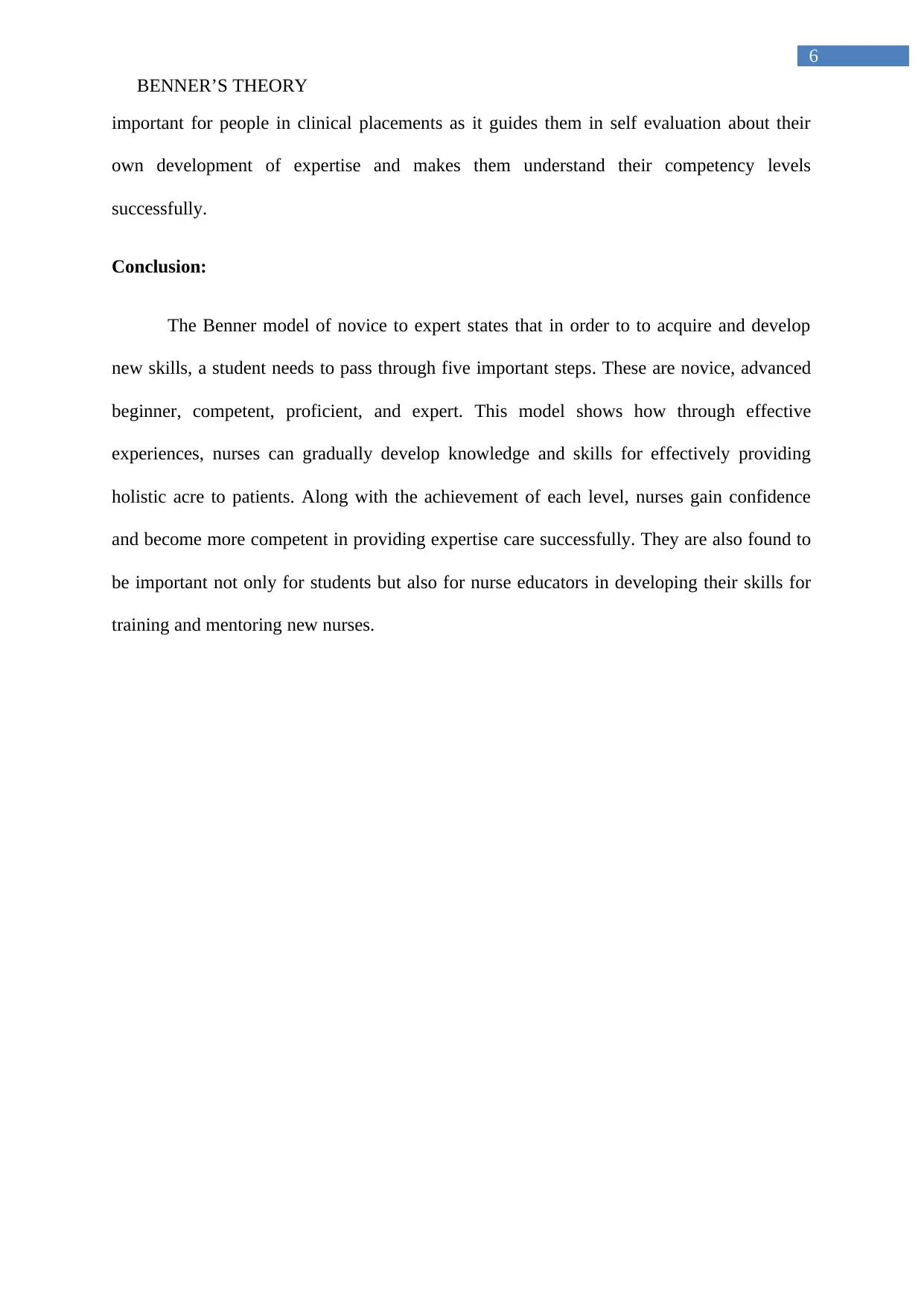
6
BENNER’S THEORY
important for people in clinical placements as it guides them in self evaluation about their
own development of expertise and makes them understand their competency levels
successfully.
Conclusion:
The Benner model of novice to expert states that in order to to acquire and develop
new skills, a student needs to pass through five important steps. These are novice, advanced
beginner, competent, proficient, and expert. This model shows how through effective
experiences, nurses can gradually develop knowledge and skills for effectively providing
holistic acre to patients. Along with the achievement of each level, nurses gain confidence
and become more competent in providing expertise care successfully. They are also found to
be important not only for students but also for nurse educators in developing their skills for
training and mentoring new nurses.
BENNER’S THEORY
important for people in clinical placements as it guides them in self evaluation about their
own development of expertise and makes them understand their competency levels
successfully.
Conclusion:
The Benner model of novice to expert states that in order to to acquire and develop
new skills, a student needs to pass through five important steps. These are novice, advanced
beginner, competent, proficient, and expert. This model shows how through effective
experiences, nurses can gradually develop knowledge and skills for effectively providing
holistic acre to patients. Along with the achievement of each level, nurses gain confidence
and become more competent in providing expertise care successfully. They are also found to
be important not only for students but also for nurse educators in developing their skills for
training and mentoring new nurses.
Paraphrase This Document
Need a fresh take? Get an instant paraphrase of this document with our AI Paraphraser
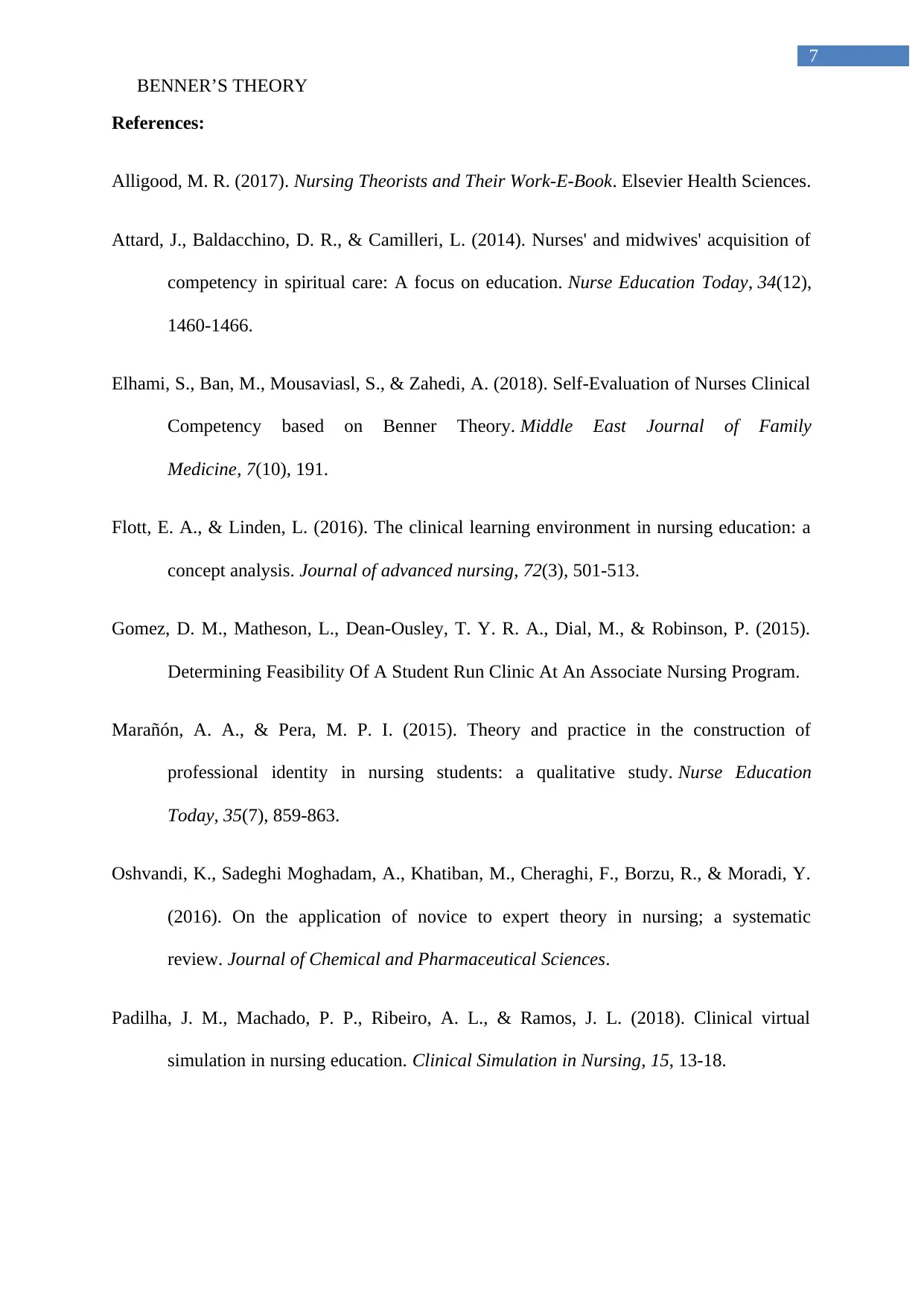
7
BENNER’S THEORY
References:
Alligood, M. R. (2017). Nursing Theorists and Their Work-E-Book. Elsevier Health Sciences.
Attard, J., Baldacchino, D. R., & Camilleri, L. (2014). Nurses' and midwives' acquisition of
competency in spiritual care: A focus on education. Nurse Education Today, 34(12),
1460-1466.
Elhami, S., Ban, M., Mousaviasl, S., & Zahedi, A. (2018). Self-Evaluation of Nurses Clinical
Competency based on Benner Theory. Middle East Journal of Family
Medicine, 7(10), 191.
Flott, E. A., & Linden, L. (2016). The clinical learning environment in nursing education: a
concept analysis. Journal of advanced nursing, 72(3), 501-513.
Gomez, D. M., Matheson, L., Dean-Ousley, T. Y. R. A., Dial, M., & Robinson, P. (2015).
Determining Feasibility Of A Student Run Clinic At An Associate Nursing Program.
Marañón, A. A., & Pera, M. P. I. (2015). Theory and practice in the construction of
professional identity in nursing students: a qualitative study. Nurse Education
Today, 35(7), 859-863.
Oshvandi, K., Sadeghi Moghadam, A., Khatiban, M., Cheraghi, F., Borzu, R., & Moradi, Y.
(2016). On the application of novice to expert theory in nursing; a systematic
review. Journal of Chemical and Pharmaceutical Sciences.
Padilha, J. M., Machado, P. P., Ribeiro, A. L., & Ramos, J. L. (2018). Clinical virtual
simulation in nursing education. Clinical Simulation in Nursing, 15, 13-18.
BENNER’S THEORY
References:
Alligood, M. R. (2017). Nursing Theorists and Their Work-E-Book. Elsevier Health Sciences.
Attard, J., Baldacchino, D. R., & Camilleri, L. (2014). Nurses' and midwives' acquisition of
competency in spiritual care: A focus on education. Nurse Education Today, 34(12),
1460-1466.
Elhami, S., Ban, M., Mousaviasl, S., & Zahedi, A. (2018). Self-Evaluation of Nurses Clinical
Competency based on Benner Theory. Middle East Journal of Family
Medicine, 7(10), 191.
Flott, E. A., & Linden, L. (2016). The clinical learning environment in nursing education: a
concept analysis. Journal of advanced nursing, 72(3), 501-513.
Gomez, D. M., Matheson, L., Dean-Ousley, T. Y. R. A., Dial, M., & Robinson, P. (2015).
Determining Feasibility Of A Student Run Clinic At An Associate Nursing Program.
Marañón, A. A., & Pera, M. P. I. (2015). Theory and practice in the construction of
professional identity in nursing students: a qualitative study. Nurse Education
Today, 35(7), 859-863.
Oshvandi, K., Sadeghi Moghadam, A., Khatiban, M., Cheraghi, F., Borzu, R., & Moradi, Y.
(2016). On the application of novice to expert theory in nursing; a systematic
review. Journal of Chemical and Pharmaceutical Sciences.
Padilha, J. M., Machado, P. P., Ribeiro, A. L., & Ramos, J. L. (2018). Clinical virtual
simulation in nursing education. Clinical Simulation in Nursing, 15, 13-18.
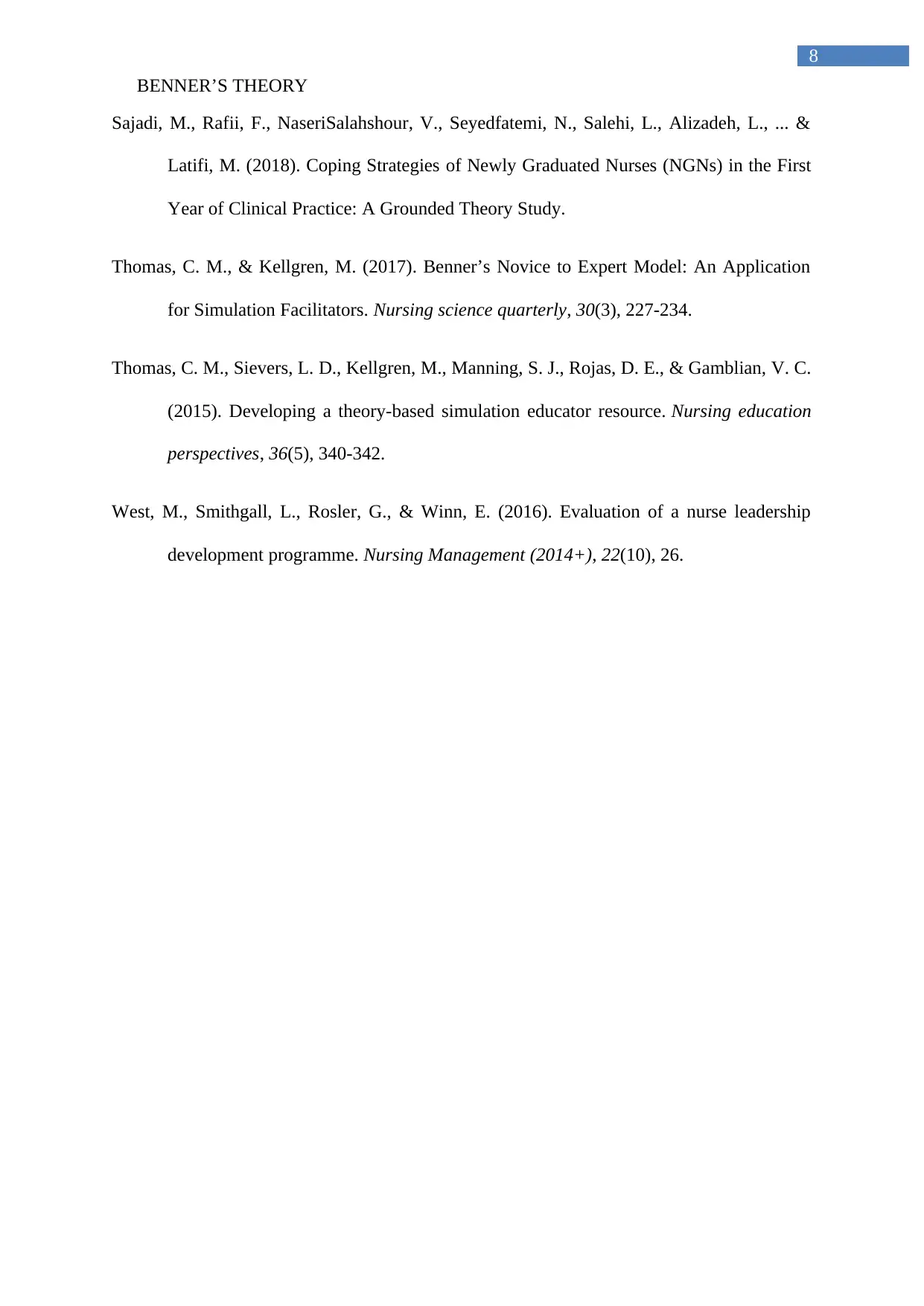
8
BENNER’S THEORY
Sajadi, M., Rafii, F., NaseriSalahshour, V., Seyedfatemi, N., Salehi, L., Alizadeh, L., ... &
Latifi, M. (2018). Coping Strategies of Newly Graduated Nurses (NGNs) in the First
Year of Clinical Practice: A Grounded Theory Study.
Thomas, C. M., & Kellgren, M. (2017). Benner’s Novice to Expert Model: An Application
for Simulation Facilitators. Nursing science quarterly, 30(3), 227-234.
Thomas, C. M., Sievers, L. D., Kellgren, M., Manning, S. J., Rojas, D. E., & Gamblian, V. C.
(2015). Developing a theory-based simulation educator resource. Nursing education
perspectives, 36(5), 340-342.
West, M., Smithgall, L., Rosler, G., & Winn, E. (2016). Evaluation of a nurse leadership
development programme. Nursing Management (2014+), 22(10), 26.
BENNER’S THEORY
Sajadi, M., Rafii, F., NaseriSalahshour, V., Seyedfatemi, N., Salehi, L., Alizadeh, L., ... &
Latifi, M. (2018). Coping Strategies of Newly Graduated Nurses (NGNs) in the First
Year of Clinical Practice: A Grounded Theory Study.
Thomas, C. M., & Kellgren, M. (2017). Benner’s Novice to Expert Model: An Application
for Simulation Facilitators. Nursing science quarterly, 30(3), 227-234.
Thomas, C. M., Sievers, L. D., Kellgren, M., Manning, S. J., Rojas, D. E., & Gamblian, V. C.
(2015). Developing a theory-based simulation educator resource. Nursing education
perspectives, 36(5), 340-342.
West, M., Smithgall, L., Rosler, G., & Winn, E. (2016). Evaluation of a nurse leadership
development programme. Nursing Management (2014+), 22(10), 26.
⊘ This is a preview!⊘
Do you want full access?
Subscribe today to unlock all pages.

Trusted by 1+ million students worldwide
1 out of 9
Related Documents
Your All-in-One AI-Powered Toolkit for Academic Success.
+13062052269
info@desklib.com
Available 24*7 on WhatsApp / Email
![[object Object]](/_next/static/media/star-bottom.7253800d.svg)
Unlock your academic potential
Copyright © 2020–2025 A2Z Services. All Rights Reserved. Developed and managed by ZUCOL.





